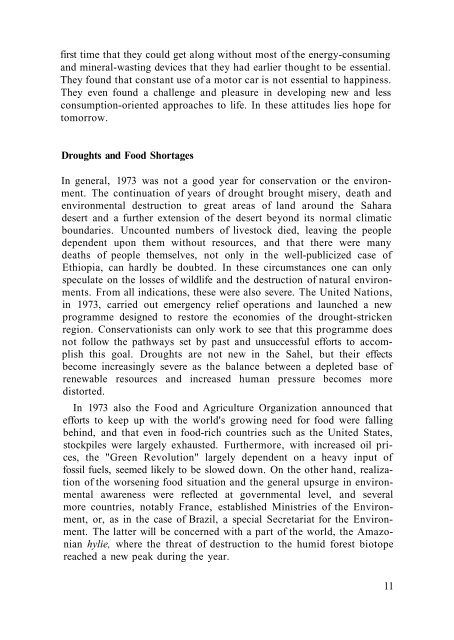1973 iucn yearbook
1973 iucn yearbook
1973 iucn yearbook
You also want an ePaper? Increase the reach of your titles
YUMPU automatically turns print PDFs into web optimized ePapers that Google loves.
first time that they could get along without most of the energy-consuming<br />
and mineral-wasting devices that they had earlier thought to be essential.<br />
They found that constant use of a motor car is not essential to happiness.<br />
They even found a challenge and pleasure in developing new and less<br />
consumption-oriented approaches to life. In these attitudes lies hope for<br />
tomorrow.<br />
Droughts and Food Shortages<br />
In general, <strong>1973</strong> was not a good year for conservation or the environment.<br />
The continuation of years of drought brought misery, death and<br />
environmental destruction to great areas of land around the Sahara<br />
desert and a further extension of the desert beyond its normal climatic<br />
boundaries. Uncounted numbers of livestock died, leaving the people<br />
dependent upon them without resources, and that there were many<br />
deaths of people themselves, not only in the well-publicized case of<br />
Ethiopia, can hardly be doubted. In these circumstances one can only<br />
speculate on the losses of wildlife and the destruction of natural environments.<br />
From all indications, these were also severe. The United Nations,<br />
in <strong>1973</strong>, carried out emergency relief operations and launched a new<br />
programme designed to restore the economies of the drought-stricken<br />
region. Conservationists can only work to see that this programme does<br />
not follow the pathways set by past and unsuccessful efforts to accomplish<br />
this goal. Droughts are not new in the Sahel, but their effects<br />
become increasingly severe as the balance between a depleted base of<br />
renewable resources and increased human pressure becomes more<br />
distorted.<br />
In <strong>1973</strong> also the Food and Agriculture Organization announced that<br />
efforts to keep up with the world's growing need for food were falling<br />
behind, and that even in food-rich countries such as the United States,<br />
stockpiles were largely exhausted. Furthermore, with increased oil prices,<br />
the "Green Revolution" largely dependent on a heavy input of<br />
fossil fuels, seemed likely to be slowed down. On the other hand, realization<br />
of the worsening food situation and the general upsurge in environmental<br />
awareness were reflected at governmental level, and several<br />
more countries, notably France, established Ministries of the Environment,<br />
or, as in the case of Brazil, a special Secretariat for the Environment.<br />
The latter will be concerned with a part of the world, the Amazonian<br />
hylie, where the threat of destruction to the humid forest biotope<br />
reached a new peak during the year.<br />
11

















